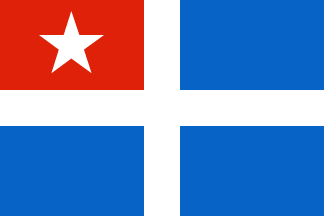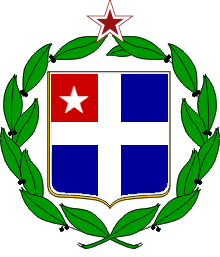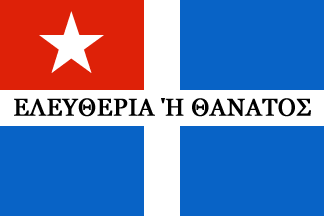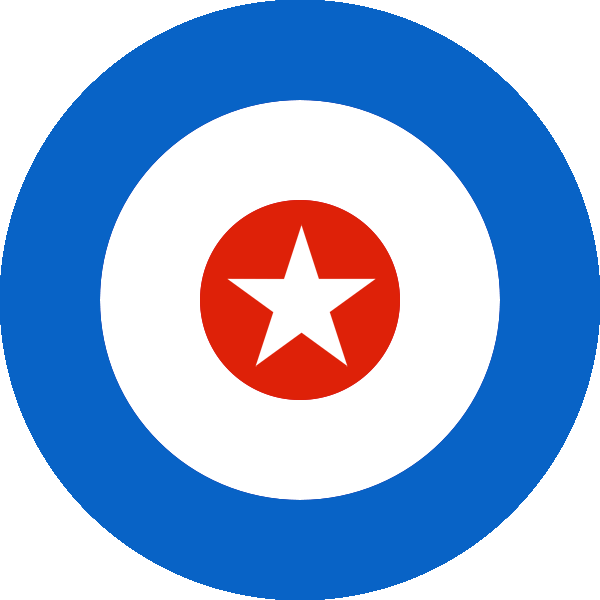Hellenic Confederation
| |||||
| Motto "Ελευθερία ή Θάνατος" | |||||
|---|---|---|---|---|---|
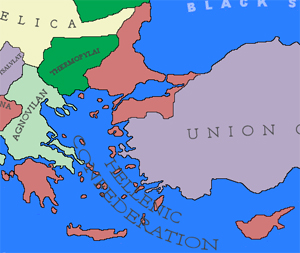
| |||||
| Region | Eastern Europe | ||||
| Capital | Iraklion | ||||
| Five largest cities | Constantinople (Istanbul), Adrianople (Edirne), Iraklion, Gallipoli (Gelibolu), Khania | ||||
| Languages - Official - Other |
Greek, Turkish; Bulgarian in the northern provinces Russian, Belarusian, English, and other | ||||
| Government - President - Premier - Governing Party |
Multiparty Socialist Democracy Aleka Papariga (KKE) Kostas Karamanlis (ND) ND, IKE | ||||
| Independence - Formation - ISAF entry |
March 22, 2006 May 26, 2006 | ||||
| Population | 1,313,400,000 (24 May 2007 est. - 10% rule) | ||||
| National animal |
Kri kri (Cretan wild mountain goat) | ||||
| Currency | Unified Drachma (Udrh) | ||||
| Membership - United Nations - Other |
None | ||||
| Abbreviations - sport - government - naval ship |
HEL (Hellas) HEL (Hellas) PKN (Ploio Kritikou Naftikou - Ship of the Cretan Navy) | ||||
| Internet TLD | .gr | ||||
| Crete Info: NationStates NSEconomy Pipian NS Tracker XML | |||||
| ISAF Info: NationStates NSEconomy Pipian NS Tracker XML | |||||
The Hellenic Confederation, also known by its informal name Greece, is a federative state in Eastern Europe lying in the southernmost portions of the Hellenic Peninsula, Thrace, and the North-west territory of the Asia Minor. Its territory includes the majority of the Aegean Islands (most notable of which are Crete and Lesbos), Cyprus, and the southern portions of the Ionian Island complex. Its position gives it a key role in international maritime trade, being a major link among the Black Sea and Mediterranean with the Baltic, as well as requirements for a huge naval force.
A maritime country and major naval power strategically situated in the sole exit and entrance of the Black Sea, Greece is controlling the Straits of Bosporus and Dardanelles, controlling passage from them according to the Convention Regarding the Regime of the Straits signed in Constantinople on December 6, 2006. The said convention has led it into territorial disputes with the Greater Crimean Republic, another naval power situated in the territories of Romania, the Crimean Peninsula, and South Ukraine, with the two countries having almost gotten at war several times in the past.
Greece is a member of the Eastern European Commonwealth of Nations and is commonly considered as a leading figure behind it. It maintains a peace-keeping force consisting of at least two Corps in Litija and a base in the south of the island of Saaremaa, Vexia, which hosts the headquarters 4th Fleet of the Hellenic Navy (its Baltic Sea deployment) as well as two divisions of the Hellenic Army and a Wing of the Hellenic Air Force. This brings the total deployment of troops outside the country to 83.110 soldiers, sailors and airmen, out of the total standing force of 700.420 (the personnel not in active reserve.)
Contents
Geography
Greece is a mainly mountainous country in its island and southern Hellenic Peninsula possessions, with the only exception being the small plains in Argolis and Helia, in the East and West of Peloponesus respectively. Its northern territories, however, are far different: both Thrace and its Asia Minor possessions are mainly covered by large plains, favouring both agricultural and industrial development as well as the concentration of population. Indeed, Thrace alone contains three of the five largest Greek cities: Adrianople (Edirne), Constantinople (Istanbul) and Gallipoli (Gelibolu). The other two major cities, Iraklion and Khania, are both situated in the island of Crete, which is the administrative heart of the maritime nation.
Administratively, the country is divided depending on the geographic regions; these regions are East Thrace, West Thrace, Bulgaria, Asia Minor, North Aegean, Cyclades, the Dodecanese, Cyprus, the Ionian Islands, Peloponesus and Crete. The city of Constantinople (with both of its portions, both in Asia and Europe), although administratively under Thrace, is effectively self-managed, with its metropolitan area being the most populated part of the country, exceeding 22 million citizens of primary Greek, Turkish and Jewish ethnicities. Common resources, apart from the country's vast agricultural potential, include oil in the Aegean Sea and off the coasts of Cyprus, as well as minor iron, carbon, silver, gold and other deposits.
Economy
The natural resources of the country vary greatly, with little minerals being present in its islands, however with a few large mines existing in Peloponesus and the Asia Minor. The country is heavily agricultural, being the region's largest producer and exporter of olive oil, as well as a major producer of bananas, grapes, grain, wine, and other agricultural products; however, its large domestic industry of both heavy and light nature allow it the production of commodities, consumer goods and heavy equipment. Government and collectively-owned industries make up about 40 percent of the country's Gross Domestic Product, with major companies including several corporations related to shipbuilding, arms manufacturing, automobile and/or aircraft manufacturing, book publishing and, of course, agriculture.
The Hellenic Confederation is an economic powerhouse of the Balkans and Eastern Europe in general. Arms manufacturing makes up a large portion of the country's industry and serves the needs of its large, burgeoning military (see the Defence section.) By Greek law, all weapons-related industries need to have at least 10 percent of their stakes controlled by the State and are subject to frequent observation and checks to assure no state secrets are leaked out of the country, although, in effect, most major weapons corporations are entirely or almost entirely under Greek governmental control. The country is especially famous for its warships and civilian maritime vessels, and international exports have included the purchase of six Type 642 Phaestos guided missile frigates by Vexia.
Politics
Greece is a confederation of three member-states; the Cretan People's Republic, which occupies the island of Crete and minor surrounding islands, the Principality of the Cassadine Islands, which occupies almost all of the remaining Aegean Islands, the Peloponnese, the Ionian possessions of the Confederation and Cyprus, and ISAF, which makes up the remaining territories in Thrace and the Asia Minor. Each constituent state has its own government and parliament, although in effect these regimes see more involvement in trans-regional politics (relations among their constituent regions, and other) rather than international or nation-wide involvement. Each state has its own constitution, capital and flag; Crete's capital is Iraklion, Cassadine's is Nafplion, and ISAF's is Constantinople.
The nation-wide political front is dominated by several parties: the Coalition of the Radical Left (Synaspismos or SYRIZA), the Communist Party of Greece (KKE), the Islamic Party, the People's Orthodox Rally (LA.O.S.) and New Democracy (ND). The former two are currently in a coalition government meant to rival New Democracy's power that has, however, seen some instability in the most recent times. Despite occasional upheaval, however, the country is open to influx of refugees and immigrants, and its population includes many Russians, Belarusians, Lithuanians and Balspanian Spaniards that form, combined, 4.7 percent of its population aside to the native Greeks, Turks, Bulgarians, Roma and Jews.
Population and Religion
The following statistics were announced by the Greek Ministry of Interior after the latest official census. Considering the country's large population, even small percentages represent large numbers of people. Most of the people non-native to the Balkan area, excluding many Russians, come from the Baltic's southern coasts that have recently seen a lot of turmoil and conflict.
Religions: Eastern Orthodox Christian (82%; Greek Orthodox 80%, Russian Orthodox 1%, Bulgarian Orthodox 1%), Sunni Muslim (17%), Other (1%; Roman Catholic 0.7%, Jewish 0.3%)
Ethnic groups: Greeks (76%), Turkish (11%), Bulgarian (6%), Russian (3%), Belarusian (2%), Other (2%; Roma 1%, Lithuanian 0.5%, Jewish 0.3%, Spanish 0.2%)
Languages: Greek, Turkish, Bulgarian, Russian, Belarusian, English, and other (Lithuanian, Yiddish, Spanish)
Foreign Relations
Throughout its short existence, the Hellenic Confederation has pursued friendly relations with active trade with the majority of the surrounding region. As a member of the Eastern European Commonwealth of Nations (EECN), it is allied to its member-states and has played a key role in representing the Commonwealth in regional affairs that concern it, as well as re-instrumenting it and modernising it at times of need and crises that required change. It advocates peaceful coexistence and has often condemned violence, whereas it maintains a peace-keeping force in Litija succeeded by the deployment of the Cretan People's Republic that was present there prior to unification.
International Disputes
Along with its states' peaceful attitude, however, the Hellenic Confederation has inherited a number of disputes, most notably over the status of Litija and the Bosporus and Dardanelles Straits. Others include the lack of recognition from the Greater Crimean Republic, the Litijan Peace-keeping Forces dispute (which itself is part of an EECN-NBC stalemate) and other minor issues, primarily over the status of former ISAF territories currently incorporated in the Union of Power, about which the Hellenic Confederation's government has tried to negotiate with authorities from UOP. Excluding the first two, however, no disputes of the Confederation are receiving, currently, any major attention from the public or the governments involved alike.
Litijan Peacekeeping Forces
Following temporary mandate over the EECN member-state of Litija by Segovia and Marsden III, after a civil war in the country during which the EECN could not dispatch forces, and after the EECN managed to dispatch forces in the region (primary in the form of then-Cretan and Orange military personnel) negotiations have began over the pullout of non-EECN forces from the country that have often resulted to a stalemate. Greece is often accused of stalling these, as, according to other diplomats' words, "it considers the Mediterranean its own backyard" and stalls negotiations over a naval base requested by Segovia and Marsden III, whereas factions of the Greek government accuse Marsden III and Segovia of imperialistic deeds over Litijan territory and neo-colonialist policies.
The Straits Dispute
Among the difficulties succeeded by the federal government, however, is the (often grave) ISAF-Trostian Straits Dispute, sparked by ISAF's withdrawal from a Bosporus and Dardanelles Straits management treaty imposed on it following its invasion of the Union of Power. Although initially without recognition for the old treaty (which is currently only recognised by Trostia's successor, the Greater Crimean Republic) the Hellenic Confederation recently drafted and ratified a new treaty with other countries (Vexia, Union of Power and Russian Federation), which is "fairer and more democratic" according to Greek leaders. Crimea, however, refuses to recognise it, and war has been threatened several times.
It should be noted that currently, primary disagreement is over certain articles of the Constantinople Straits Convention that give Greece the right to control the passage of warships should it be belligerent, as well as limits the simultaneous use of the Straits by a large number of warships. It is generally hoped that this will allow for a peaceful settlement of the dispute and end the ongoing stalemate between the two naval powers; attempts have been made, however, with little results this far. In any case, the situation looks both promising as well as deteriorating.
The Galician Civil War
Main article: Galician Civil War
Greek military units have been actively involved in the civil war in Galicia, which includes the Greater Crimean Republic and the Galician government on one side, the Hellenic Confederation and the Hetmanate on the rebel side, and Malorek and Serbonia as rogue powers. Despite the tensions hat have risen from this move, no actual violence has yet occurred between the forces of Greece and other nations (excluding Galician government troops) although this appears to be about to change. Investigation prior to the 2007 parliamentary election has suggested that the involvement of the country in the Civil War might be a result of the military attempting to take charge.
Defence
The Hellenic Confederation is often accused by domestic and foreign factors of being extraordinarily militant. With an indigenous arms industry that serves its burgeoning military's (and especially navy's) needs, Greece is renowned for its universally compulsory military service, large military numbering a total of over 700.000 active and 1.958.000 reservist personnel of both sexes, and a total defence budget amounting for $16.9 trillion (roughly Udrh 9.6 trillion). Although attempts have been made to cut down on military spending and size recently, these attempts have been effectively torpedoed by the sour Greek-Crimean relations due to the Bosporus and Dardanelles Strait Crisis. The Hellenic Armed Forces, aside to their vast manpower, also operate 3.240 aircraft, 215 ships (each with its own unique name), ans massive amounts of tanks and armoured vehicles. They consist of 88 Mechanised and 36 Tank divisions organised under nine Armies, as well as four fleets with four Naval Aviation wings, and 4 Air Armies and 9 independent Air wings.
The branches of the Greek Military are the Army, the Navy, the Air force and the Air defence. In wartime, Civil defence, consisting of conscripted or volunteer militia paramilitary units might also be formed. The modern Greek military has its roots in the land forces of ISAF, the military technology of the Cretan and ISAF arms industries, and the navy of the formerly independent Cretan People's Republic. It should be noted that, as ISAF's territory is the most densely populated and among most economically active regions, it is, in essence, supporting much of the Greek military through the funding that commences.
Foreign Deployments
Total Greek foreign deployments amount 83.110 military personnel, the vast majority of which are deployed in the vicinity of Litija, very close to the Confederation's home ground. Another 100.000 was deployed up to recently in Litija and Vexia. A large component of those 83.110 troops belong to the Hellenic Navy and its carrier-borne wings deployed with the 4th Flotilla and 4th Fleet in the Adriatic and Baltic Sea respectively. The 4th Flotilla forms an integral part of the larger, more sophisticated 2nd Fleet of the Hellenic Navy, operating in the Ionian and Adriatic Seas. The precise number of deployments remains a well-guarded state secret.
- Litija: Peace-keeping forces under the banner of the EECN.
- Vexia: Naval and air force presence maintained in Saaremaa.
- Elostrian: Naval and air force presence maintained in Hiitumaa.
Service
Conscription is compulsory for both sexes in Greece, and the term is 26 months: 2 months of training and 24 months of service. This, combined with the nation's massive size, expectedly turns out a massive surplus of conscripts, however the majority are being channelled in alternative services in economic sectors instead, in a style much like serving in the regular force however under different terms and circumstances. This work force, effectively providing cheap hands for the state, helps maintain the massive economy worth $42.3 trillion along with retaining its status as a major East European powerhouse.
But even the military units are not completely engaged in military duties. The majority of the military personnel (approximately 2 million troops, officers and other employees) are used in 'active reserve' units, allowed to mainly resume their regular lives paired with 'half-time' military service, further augmenting the economy. Although not like the Capital Praetor Air Force measures that continuously loop personnel, this system could be considered similar in the sense that the military personnel is participating actively in the economic life of the country and allowing the economy to function smoothly.
Budget
Note: This section uses financial information from NSDossier, that might not be accurate.
With total expenses of $16.9 trillion, the Greek military budget is huge (close to one-half the GDP) however the figures can be misleading, since only a minority of that money ends up in military hands - roughly $5.4 trillion, which includes the procurements budget. The remaining $11.5 trillion is used in projects of 'collective importance,' or, of both military and civilian importance; this includes maintenance and expansion of the infrastructure, allocation of funds to industries or countries for investment or cover-up of state-owned company losses, charity, maintaining of an effective logistics network, give loans or aid to national or international entities, logistic support to forces stationed abroad and active-reserve units, as well as, mainly, domestic consumption on behalf of both military and civilian factors, military personnel supporting or conducting civilian tasks or contracts, and other things.
It could be thus said that, in essence, this extra money form a 'backup' for the military to use in any fiscal year when war might arise without needing parliamentary debate. The $11.5 trillion 'reserved' in that manner can, however, be allocated to make urgent purchases or conduct highly required research and development of weapon systems when the time is needed, something that further blurs the line between a clean military and a clean non-military budget in that sum. Such money has been controversially used in the past to research highly classified projects that have only recently been revealed to public: such an example is the VP-75 Sfyra missile and the country's bio-chemical weapons arsenal.
Greece and Weapons of Mass Destruction
Although not detailed, the country is a known possessor of a bio-chemical weapon deterrent according to its very own government. Weapons of mass destruction are to be used, under the Greek military policy, for a Samsun Strike: taking into account how densely populated the country is and how dramatic can a battle be for the fate of the country, this arsenal is meant to assure peace as well as be used against 'strategic targets' during a time of war 'to disable the enemy from being able to conduct war against the Hellenic Confederation anymore.' Aside to that, it is meant as a counter-measure against the use of such weapons on Greece by external factors. As it is expected, however, the government is highly criticised about the possession of such agents.
See also
- Eastern Europe
- Eastern European Commonwealth of Nations
- Flag of the Hellenic Confederation
- National Emblem of the Hellenic Confederation
